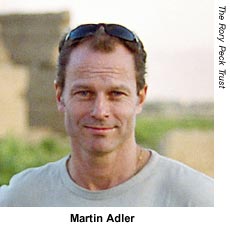New York, June 23, 2006—The Committee to Protect Journalists is deeply shocked by the killing of award-winning Swedish journalist and photographer Martin Adler, who was shot by an unidentified gunman while filming a demonstration in the Somali capital Mogadishu today. Adler, a long-time contributor to Britain’s Channel 4 News, was freelancing for several newspapers including the Swedish daily Aftonbladet.
“We mourn the loss of our colleague Martin Adler, a courageous journalist who received international acclaim for his investigative reporting,” said CPJ Executive Director Ann Cooper. “Somalia’s transitional government and the Islamic courts which control Mogadishu must now make it a priority to find and prosecute his killer.”
An Associated Press reporter who witnessed the murder said the gunman came up from behind Adler and shot him through the back at close range before disappearing into the crowd. Adler died instantly. He was covering a demonstration organized by the Islamic Courts Union which seized control of Mogadishu on June 5 from warlords backed by the United States. Several reports said he was filming demonstrators burning U.S. and Ethiopian flags. The National Union of Somali Journalists reported that Adler was standing right in the crowd, not in the heavily guarded area where many other journalists and Islamic courts leaders were standing.
The rally, attended by thousands, was in support of a peace agreement reached on Thursday in the Sudanese capital Khartoum between the Islamic courts and Somalia’s transitional government. The marchers were also protesting against the suggestion that foreign peacekeepers be sent to Somalia, according to the BBC. This issue remains a strong bone of contention between the Islamic courts and the transitional president, Abdullahi Yusuf, who supports foreign intervention and is perceived as close to neighboring Ethiopia. The transitional government, based in the city of Baidoa, is backed by the United Nations and several countries in the region.
Anti-foreigner sentiment has been stoked by reports that widely despised warlords who had opposed the Islamic group were financed by the CIA to capture suspected al-Qaeda members in Somalia. International journalists have been stoned or heckled while reporting on demonstrations recently, AP said.
In a statement, Britain’s Independent Television News company called Adler “a long term friend of ITN and Channel 4 News” who had “contributed outstanding journalism and film making.” Adler won many international awards, including the 2001 Amnesty International Media Award, a Silver Prize for investigative journalism at the 2001 New York Film Festival, and the 2004 London-based Rory Peck Award for Hard News for a report which exposed abuses by U.S. troops in Iraq. He had worked in more than two dozen war zones, including Iraq, Afghanistan, Bosnia, Rwanda, Congo, and Sierra Leone.
Adler was born in Stockholm of Anglo-Swedish parents, according to the Web site of the Rory Peck Trust. He leaves a wife and two daughters who live in Sweden.
“This senseless killing shows that Somalia is still one of the most dangerous places in the world for journalists,” added Cooper
Last year, Kate Peyton of the BBC, one of several foreign reporters who entered the country to cover the peace process in early 2005, was shot dead in Mogadishu in January. Six months later, local radio journalist Duniya Muhyadin Nur was shot dead while covering a protest near the capital.
At least 14 journalists including Adler have been killed in Somalia because of their work since the fall of former dictator Siad Barre in 1991, according to CPJ research. The country has had no effective central government since then.
